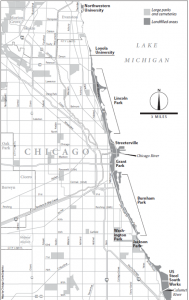Thank you to my colleague, Professor David A. Strifling, director of Marquette Law School’s Water Law and Policy Initiative, for his generous post a few weeks ago concerning Tom Merrill’s and my new book, Lakefront: Public Trust and Private Rights in Chicago (Cornell University Press). The book ranges over almost two centuries and the different stories that led to the Chicago lakefront’s varied but largely integrated and altogether splendid whole. Given these temporal and geographic variations, “the core insight that shapes Kearney and Merrill’s Lakefront”—that “[t]he making of Chicago’s extraordinary landscape along Lake Michigan required law, lots and lots of law” (Professor Hendrik Hartog of Princeton University)—made intuitive sense to us from the beginning. Or at least it did to my coauthor, a noted scholar of property law.

Yet as our book’s title suggests, however much other law has been involved, the public trust doctrine has been at the forefront of lakefront controversies, at least since the Supreme Court of the United States used the Lake Front Case (more formally known as Illinois Central Railroad Co. v. Illinois, 146 U.S. 387 (1892)) to announce the American experiment with the doctrine. So Professor Merrill and I took a guest-blogging opportunity at the Volokh Conspiracy this past week to focus on the public trust doctrine. Here are links to our series of posts:
- Lakefront and the Origins of the American Public Trust Doctrine (June 14, 2021)
- Lakefront and the Confoundments of the Public Trust Doctrine (June 15, 2021)
- Lakefront—Comparing Public Trust and Public Dedication (June 16, 2021)
- Lakefront and the Public Trust Doctrine—Enter Professor Sax (June 17, 2021)
- Lakefront and the Public Trust Doctrine Today: A Litigation Roulette Wheel (June 18, 2021)
You can find us a month or so from now guest-blogging at The Faculty Lounge, where we expect to consider the rules that govern—or might govern—who has standing to raise the different sorts of legal claims whose disposition has helped shape the Chicago lakefront. Each of these rules is in some way problematic, and differences among them have had notable effects on what a resident or tourist today finds on the lakefront—and what he or she does not. “[L]ots and lots of law,” it has been said.

The common law public trust doctrine in California has long played an important role. We are projects have looked to the public trust doctrine to advance their goals.
The book ranges over almost two centuries and the different stories that led to the Chicago lakefront’s varied but largely integrated and altogether splendid whole. Given these temporal and geographic variations, the core insight that shapes Kearney and Merrill’s Lakefront. Thanks for this post.